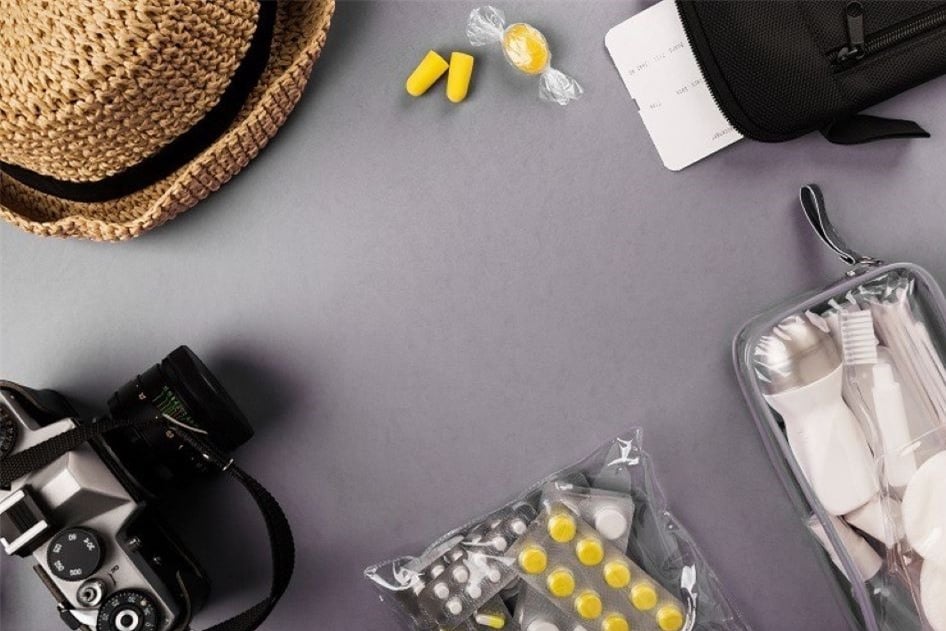Below is a list of must-have travel medications.
Motion sickness medication
Motion sickness medication is a great support for continuous movement in the car. Depending on the constitution and health status of each person, there are different manifestations, mainly dizziness, nausea and fatigue. Therefore, to overcome the above conditions, you should bring motion sickness medication. Some oral antihistamines such as dimenhydrinate, diphenhydramine, promethazine, meclizine... are often used to prevent motion sickness.
Take 30 minutes before getting in the car so that the medicine has enough time to release the active ingredient and absorb and take effect. However, the medicine can cause some side effects such as drowsiness, dry mouth, blurred vision, etc. Be careful when using motion sickness medicine at the same time as paracetamol, ibuprofen because some anti-motion sickness drugs can interact with these drugs.
There are now anti-nausea medications in the form of patches that are applied to the skin behind the ear. These patches should be applied to the skin behind the ear 6-12 hours before boarding a vehicle or train, and are quite convenient.
Digestive medicine
You may experience symptoms such as bloating, indigestion, digestive disorders, diarrhea, constipation… while traveling. Therefore, you should prepare in advance:
- Rehydration and electrolyte solution: Use when having diarrhea, vomiting, frequent bowel movements to prevent dehydration. Prefer powder form which is more convenient to carry. Diarrhea-stopping drugs such as loperamide...
- Constipation medications such as: Duphalac, sorbitol...
- To reduce symptoms of bloating and belching due to gas accumulation, you can use ginger tea or medicines containing simethicone in pill or drop form...
- Probiotics provide beneficial intestinal bacteria, used in case of digestive disorders.
Massage medicine
Moving from one place to another constantly with outdoor activities will sometimes make your feet ache. Massage lotions will help you erase those uncomfortable aches and pains.
Anti-allergy drugs
Weather allergies, food allergies or insect bites are common problems when traveling.
Anti-allergy medications in pill or cream form, topical gel, often containing ingredients such as loratadine, desloratadine, cetirizine or fexofenadine... can be used to reduce itching, rash, puffy eyes and runny nose caused by allergies to food, pollen, weather...
Side effects of antihistamines can cause drowsiness. Some medications should be used with caution in children and pregnant women. Therefore, it is necessary to consult a pharmacist before buying medication.
Eye drops, nose drops
Traveling is not just about sightseeing, but also about experiencing many interesting outdoor activities. Therefore, it is very likely that your eyes will be dry. In particular, in the case of foreign objects falling into the eyes, even mascara, it will make the eyes feel irritated and uncomfortable. Therefore, you should prepare saline solution for eye and nose drops for the trip, especially during the changing seasons.
You can prepare additional eye drops to prevent dry eyes, provide vitamins for the eyes, medicine to treat red eyes, vasoconstrictors to prevent nasal congestion, etc.
Pain reliever and fever reducer
When you come to a new environment, the change in weather and climate can easily make you catch a cold. Therefore, you need to use fever-reducing and pain-relieving drugs immediately so as not to affect your fun. In the case of children, if they have a high fever and are not treated promptly, it can be very dangerous. Some common pain-reducing, fever-reducing, and cold-reducing drugs include Paracetamol, Panadol, Decolgen, Amocilin, Cefalexin, etc.
Prescription medications currently being taken
If you are taking medication prescribed by your doctor, be sure to bring your prescription to ensure you take the correct dosage. Imagine forgetting to bring your prescription for high blood pressure, heart disease, etc. The consequences will be dire.
According to doanhnghiepvn.vn
Source

































































































![[Infographic] In 2025, 47 products will achieve national OCOP](https://vphoto.vietnam.vn/thumb/402x226/vietnam/resource/IMAGE/2025/7/16/5d672398b0744db3ab920e05db8e5b7d)







Comment (0)